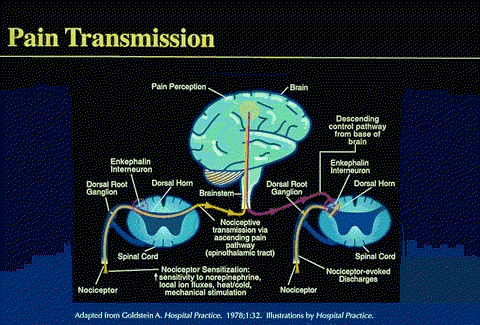- Transmission of impulses, which as
they reach consciousness will be interpreted as
pain, begins with the activation of specific
peripheral receptors called nociceptors by
disease- or surgery-induced tissue injury.
- Nociceptors usually respond to
high intensity, potentially damaging stimuli.
- Inflammatory processes
often associated with disease or tissue
trauma play a role in the initiation of
nociception, mostly by sensitizing the
nociceptors:
- which causes
lowering of their activation
threshold.
- Both A- and C-class
nociceptors and their corresponding
afferent fibers are the most important
carriers of nociceptive stimuli from the
skin, deep somatic structures, such as
muscle and bone, and viscera.
- On going nociceptor-evoked
discharges carried by these afferent
fibers enter the spinal cord via the
dorsal roots, extending into several
ascending nociceptive pathways.
- The dorsal horn is not
only a relay station for these signals,
but also an area in which complex data
integration of excitatory or inhibitory
modulation occurs.
courtesy of Roxane Pain Institute used
with permission http://pain.roxane.com/sitemap.html
|
